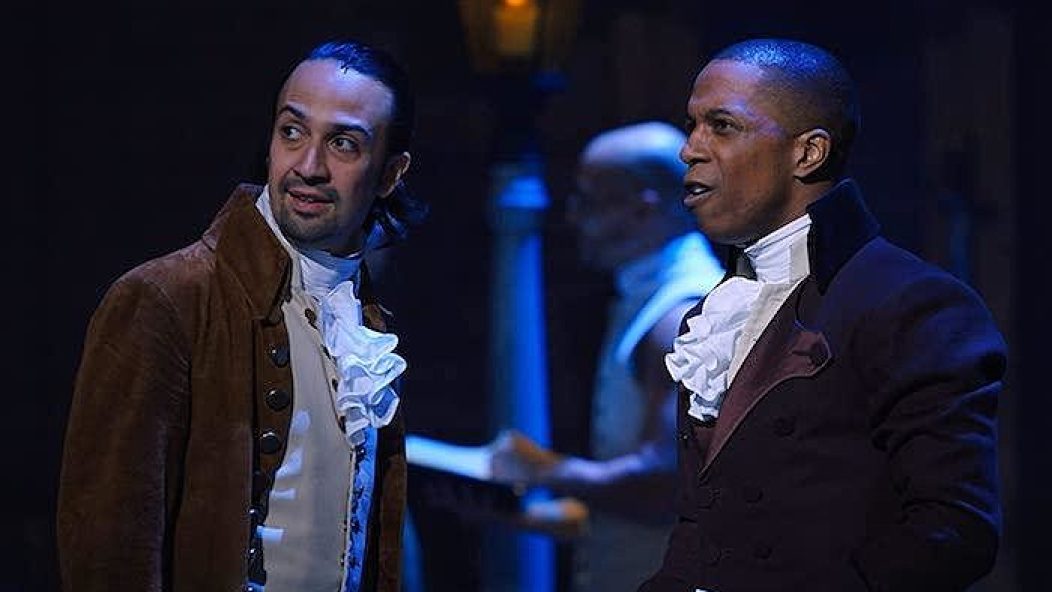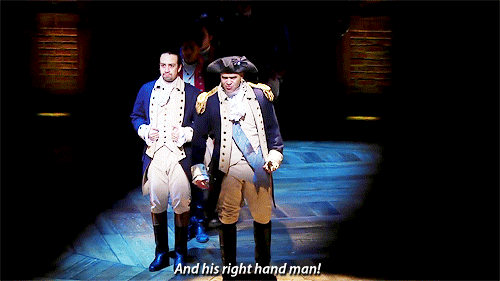
10 ways ‘Hamilton’ reminds us we’re still fighting the same battles
Thanks to Disney+, Hamilton is back in the public eye. While you sing along to the music and marvel at Lin-Manuel Miranda’s wit, there are countless comparisons between Hamilton and the wild times we’re living through right now.
Hopefully, this list will reinforce the musical’s brilliance and give you a new lens in which to view the art. More importantly, it’s a reminder that some of our current struggles aren’t unique, and if Hamilton could navigate them, so can we. Let’s dive into the lyrics and see what the musical’s interpretation of history can teach us about our world today.
Read more: Ryan Reynolds almost wore a different suit in ‘Deadpool 2’
More opportunities for all
“My Shot” is the signature song in Hamilton. You likely associate the lyrics “I am not throwing away my shot” with the musical, even if you’ve never stepped foot in a theater. Hamilton lays out his ambitions in the tune but laments his social status. “The problem is I got a lot of brains but no polish/I gotta holler just to be heard,” he sings as his family was too poor for regular schooling. His friend Hercules Mulligan (what a name) later spits, “I’m joining the rebellion ’cause I know it’s my chance/To socially advance instead of sewin’ some pants.” Money still talks, buying the rich a political voice, spots at prestigious institutions and even out of jail. Those without it still “gotta holler” just to break even. The battle to close the opportunity gap continues.
Safety for change advocates
Let’s stick with “My Shot” because its lyrics and themes echo throughout the rest of the musical. Forever his adversary, Aaron Burr attempts to qualm Hamilton’s hopes for revolution, claiming “I’m with you, but the situation is fraught/You’ve got to be carefully taught/If you talk, you’re gonna get shot!” This discourse played out, of course to a much less violent degree, during the recent Black Lives Matter protests. People faced tear gas, dangerous antagonists and weapon-touting resistors in their attempt to stand up against systemic injustice. The battle for serious change still is, and probably always will be, met with opposing violence.
Federal and states’ rights
Opinions over states’ rights spur countless quarrels, leading to legislation affecting everything from what you pay taxes on to whether or not women control their own reproductive systems. That balance of power is regularly weighed in congressional halls and at dinner tables across the country. It’s a recurring battle between Hamilton, Thomas Jefferson and James Madison, played out prominently in the “Cabinet Battle” songs. Hamilton hoped to establish a national bank, absorbing the state department. Secretary Jefferson felt it hampered Southern states, who are debt-free because they used free labor, aka slaves. Hamilton eventually uses his writing prowess to pen most of The Federalist Papers, urging the people to adopt a strong federal government.
Read more: Are P!ATD and ‘Hamilton’ star Lin-Manuel Miranda planning a collab?
Legislative votes

Sticking with the song “Cabinet Battle #1,” Hamilton begs George Washington to support his state bank idea. Washington takes his side knowing Hamilton’s “bold strokes” plan won’t make it out of Congress. Indeed, the Revolutionary War hero is correct. Like during our country’s infancy, final versions of legislation are often much different than their original drafts in congressional committees. Politicians need to compromise to draw required votes from the other side of the aisle, a task increasingly difficult during politicized times. Hamilton learned that the hard way. As Washington says in the song, “Winning was easy, young man/Governing’s harder.”
Less political animosity
In Hamilton, the political animosity mostly stayed bottled up inside congressional walls, maybe spilling out in the form of personally published pamphlets. Now, dirty laundry between politicians airs over countless news sources, Twitter, mailing lists, ads on Snapchat and just about anywhere. But political battles, whether they be petty or over policy, are just as cutthroat today as they were in Hamilton. But now politicians have more weapons in the arsenal to attack. Watching Burr get jealous over Hamilton’s power or seeing John Adams fire Hamilton over social media would be quite a sight. Ultimately, it’s the American people who are truly fighting for a healthier, more efficient political environment.
Read more: ‘Hamilton,’ ‘The Mighty Ducks’ and more are heading to Disney+ in July
More women in power
It may not be a chief theme in Hamilton, but the witty Angelica Schuyler, Hamilton’s sister-in-law and, uh, soulmate, often highlights the importance of including women in Parliament. In “The Schuyler Sisters” she belts, “So listen to my declaration: ‘We hold these truths to be self-evident/That all men are created equal’/And when I meet Thomas Jefferson/I’m ‘a compel him to include women in the sequel!” Obviously, they weren’t called the “Founding Fathers” because of their diversity. More than 200 years later, only 23.7% of congressional seats are filled by women, and only 7.4% of Fortune 500 CEOs are women.
Big change
Like in 2020, creating real change was a battle for Hamilton. In “Farmer Refuted,” loyalist Samuel Seabury echoes the King of England’s talking points, which are (of course) against the Revolution. Hamilton rebuttals with an array of insults and logic arrows, arguing “Why should a tiny island across the sea/Regulate the price of tea?” It’s hard to name a great cause that still isn’t met by some resistance. Protestors of injustice often clash with counter-protesters. Constitutional straw-grasping regularly weighs down progressive legislation. Change is rarely easy because there will always be a Seabury hoping to keep things the same.
Read more: Jordan Peele, Lin-Manuel Miranda and more Hollywood figures stand behind John Boyega
The conversation around marital taboos
Hamilton self-detonated his own presidential ambitions in a 1797 tell-all pamphlet (maybe the 1700s equivalent to a 3 a.m. tweet) about an extramarital affair and blackmail payments to cover it up. Do you think that should have hurt his presidential chances? Affairs often derail political careers, even when the most outlandish of policies don’t. It was partially the downfall of Bill Clinton and has at least muddied Donald Trump’s already, should we say, nebulous reputation. Celebrities, business owners, doctors, police officers—probably no profession is immune to being damaged by an extramarital affair. We seem more accepting of marital mishaps now than 200-plus years ago. It’s a complex, moral battle with sides less defined than most other conversations.
Fairer elections
Our earliest presidents are sometimes viewed through rose-colored glasses. But leadership was just as lackluster back then as it is now. Take Adams, who is destroyed by Hamilton in “The Adams Administration,” beleaguered by King George III in “I Know Him” (“That poor man, they’re gonna eat him alive!/…They will tear each other into pieces/Jesus Christ, this will be fun!”) and Jefferson when he says “John Adams shat the bed/I love the guy, but he’s in traction” in “The Election Of 1800.” Adams wasn’t necessarily the best presidential candidate but benefited from a divided political environment, his association with Washington and a setup that empowered presidential electors. Sound familiar? The battle for a system that yields more representative politicians is still fought in conversations surrounding the Electoral College, electability, voting regulations, laws surrounding our local elections and how primary elections should be held.
Civility
In “Ten Duel Commandments,” Hamilton preaches for consistent civility during the duel process. The line “You pay him in advance, you treat him with civility/You have him turn around so he can have deniability” says as much. The musical pins it as his downfall when he fires his pistol toward the sky during his duel with Burr, while his opponent pulls the trigger with deadly intentions. Hamilton’s final stand for civility proved fatal. Like Hamilton, we still battle for civility in a social landscape with opposite worldviews colliding like giant tectonic plates. The dueling practice is outdated (phew!), but we clearly still lack empathy for opposing viewpoints and a propensity for civility when hashing out disagreements. Hamilton set an example for us to follow.








